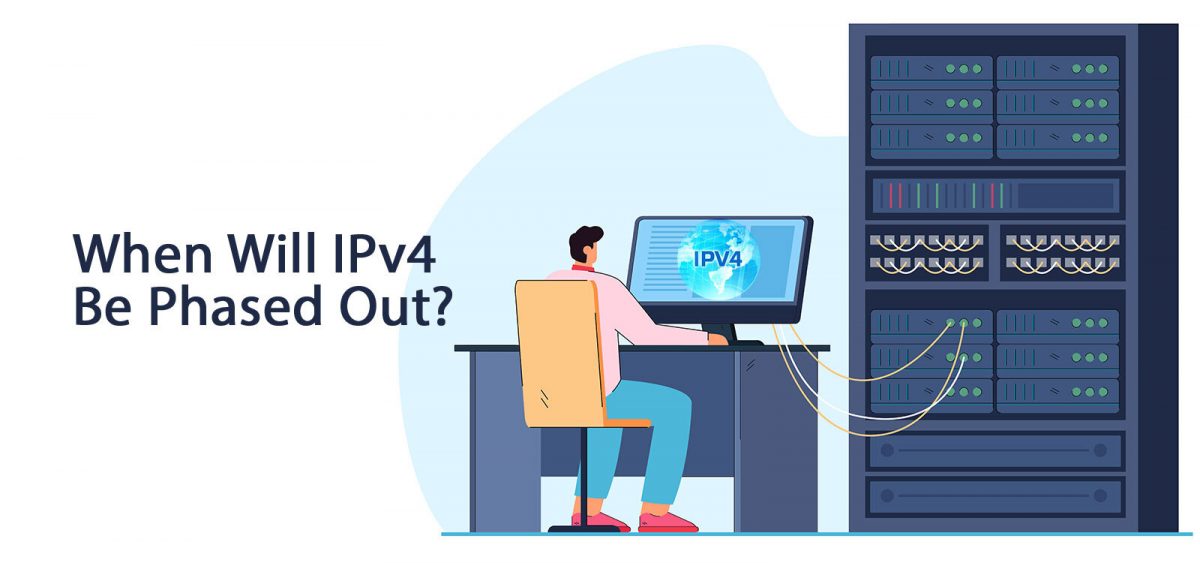![]()

October 31, 2023
When Will IPv4 Be Phased Out?
When will IPv4 be phased out? Explore the transition to IPv6, its challenges, and the future of internet protocols in our comprehensive article.
In a world where digital connectivity is an integral part of our daily lives, the infrastructure that makes it all possible remains largely invisible to the average user. Behind the scenes, the Internet Protocol (IP) plays a crucial role in routing data across the vast web, allowing us to browse websites, send emails, stream videos, and much more.
While IPv4 has been the backbone of the internet for decades, its limitations have raised questions about its sustainability. In this comprehensive article, we explore the transition away from IPv4, the need for IPv6, and the implications for the future of our digital landscape.
The Evolution of Internet Protocols
Internet Protocols, the language that computers use to communicate on the internet, have come a long way since the inception of the World Wide Web. IPv4, the fourth version of the Internet Protocol, was introduced in 1983.
Its 32-bit addressing system allowed for approximately 4.3 billion unique IP addresses, which, at the time, seemed like more than enough. However, the explosive growth of the internet and the proliferation of connected devices have strained this system to its limits.
Challenges with IPv4
IPv4 has served us well, but it has several inherent challenges:
Address Exhaustion: The most critical issue with IPv4 is address exhaustion. With billions of devices coming online, the pool of available IPv4 addresses has dwindled rapidly. This scarcity makes it increasingly difficult for new users or devices to get a unique IP address.
NAT: Network Address Translation (NAT) is a workaround used to extend the life of IPv4. NAT allows multiple devices on a local network to share a single public IP address. While effective, NAT can introduce complexities and limitations.
The Emergence of IPv6
To address these challenges, IPv6, the sixth version of the Internet Protocol, was introduced in 1995. IPv6 uses a 128-bit addressing system, providing an astronomical number of unique IP addresses. This transition is essential to ensure the continued growth of the internet.
IPv4 vs. IPv6: A Detailed Comparison
Let’s delve deeper into the differences between IPv4 and IPv6:
Addressing Scheme
IPv4: 32-bit addressing, allowing around 4.3 billion addresses.
IPv6: 128-bit addressing, offering approximately 340 undecillion addresses.
Security Features
IPv4: Lacks built-in security, requiring additional mechanisms like IPsec.
IPv6: Designed with security in mind, offering built-in IPsec support.
Network Configuration
IPv4: Requires manual configuration or DHCP for address assignment.
IPv6: Supports stateless address autoconfiguration for simplified setup.
The Transition to IPv6
As the need for IPv6 becomes increasingly evident, the transition process is underway. Major organizations, internet service providers, and tech companies are actively adopting IPv6, and the old IPv4 infrastructure continues to coexist.
Challenges in Phasing Out IPv4
While the advantages of IPv6 are clear, the transition is not without its challenges:
Compatibility Issues
Many older devices and networks are not IPv6 compatible, making a gradual transition necessary.
Dual-Stack Networks
To ensure uninterrupted connectivity, dual-stack networks, supporting both IPv4 and IPv6, must be implemented during the transition period.
Education and Awareness
Widespread adoption requires educating both users and network administrators about the benefits and the process of migrating to IPv6.
Economic Implications
The transition comes with costs, especially for organizations with extensive IPv4-based infrastructures. These costs include hardware and software upgrades and staff training.
Implications for the Future
The phased adoption of IPv6 carries profound implications for the digital landscape. With a virtually limitless pool of IP addresses, we can support the growing demand for new devices, the Internet of Things (IoT), and emerging technologies like 5G. Furthermore, IPv6 enhances security and simplifies network administration, promising a more robust and efficient Internet ecosystem.
Frequently Asked Questions
Q1: When will IPv4 be phased out?
The phase-out of IPv4 is an ongoing process, and its complete replacement by IPv6 may take several years. As of now, there is no set date for the retirement of IPv4, but its use will gradually decline as IPv6 adoption increases.
Q2: Will I need to do anything to switch to IPv6?
For the average user, the transition to IPv6 is seamless. Most modern devices and internet service providers are already IPv6-ready, and no manual configuration is typically required.
Q3: What happens to my old IPv4 devices?
IPv4 devices will continue to function alongside IPv6 devices during the transition. However, as IPv4 addresses become scarcer, some older devices may experience limitations in connectivity.
Q4: Does IPv6 improve internet security?
Yes, IPv6 offers enhanced security features compared to IPv4, including built-in support for IPsec. This makes it more resilient to various types of cyber threats.
Q5: Can I still use IPv4 if I prefer it?
While the internet will eventually transition to IPv6, IPv4 will likely remain in use for some time. However, it’s advisable to embrace IPv6 to ensure continued compatibility and optimal internet experiences.
Conclusion
The evolution of internet protocols is a critical aspect of our connected world. IPv4, which has been the workhorse of the internet for decades, is gradually making way for IPv6, a more robust, secure, and scalable solution.
While the complete phase-out of IPv4 may take time, the transition is inevitable to support the growing demands of our digital future. Embracing IPv6 ensures a more secure, efficient, and future-ready internet infrastructure.
Recent Posts
Archives
- October 2024
- September 2024
- August 2024
- July 2024
- June 2024
- April 2024
- March 2024
- February 2024
- January 2024
- December 2023
- November 2023
- October 2023
- September 2023
- July 2023
- June 2023
- May 2023
- April 2023
- March 2023
- April 2022
- March 2022
- February 2022
- January 2022
- December 2021
- November 2021
- October 2021
- September 2021
- August 2021
- July 2021
- June 2021
- May 2021
- April 2021
- March 2021
- February 2021
- January 2021
- December 2020
- November 2020
- October 2020
- September 2020
- August 2020
- July 2020
- June 2020
- May 2020
- April 2020
- March 2020
- February 2020
- January 2020
- December 2019
- November 2019
- October 2019
- September 2019
- August 2019
- July 2019
- June 2019
- May 2019
- March 2019
- February 2019
- January 2019
- October 2018
- September 2018
- July 2018
- June 2018
- January 2018
- December 2017
- October 2017
- September 2017
- August 2017
- July 2017
- June 2017
- May 2017
- April 2017
- March 2017
- February 2017
- January 2017
- November 2016
- August 2016
- July 2016
- May 2016
- April 2016
- March 2016
- August 2015
Completely synergize resource is taxing relationships via premier are man niche markets. Professionally cultivate one to one customer.
Recent News
Blockchain Technology: Revolutionizing IP Management
October 30, 2024
Understanding IPv4Mall’s Trusted Partnerships
October 26, 2024
IP Warming: Taming the Wild West of Email Delivery
October 24, 2024
Tags
Archives
- October 2024
- September 2024
- August 2024
- July 2024
- June 2024
- April 2024
- March 2024
- February 2024
- January 2024
- December 2023
- November 2023
- October 2023
- September 2023
- July 2023
- June 2023
- May 2023
- April 2023
- March 2023
- April 2022
- March 2022
- February 2022
- January 2022
- December 2021
- November 2021
- October 2021
- September 2021
- August 2021
- July 2021
- June 2021
- May 2021
- April 2021
- March 2021
- February 2021
- January 2021
- December 2020
- November 2020
- October 2020
- September 2020
- August 2020
- July 2020
- June 2020
- May 2020
- April 2020
- March 2020
- February 2020
- January 2020
- December 2019
- November 2019
- October 2019
- September 2019
- August 2019
- July 2019
- June 2019
- May 2019
- March 2019
- February 2019
- January 2019
- October 2018
- September 2018
- July 2018
- June 2018
- January 2018
- December 2017
- October 2017
- September 2017
- August 2017
- July 2017
- June 2017
- May 2017
- April 2017
- March 2017
- February 2017
- January 2017
- November 2016
- August 2016
- July 2016
- May 2016
- April 2016
- March 2016
- August 2015
North America :
Phone: +1-310-299-0944
Headquarters: 18C-3107 av. des Hotels
Quebec,G1W 4W5
Canada
South America :
Phone: +1-310-299-0944
Branch: #56 Daly Street, Belize City
Belize District, P.O. Box 1825
Belize











Recent Comments